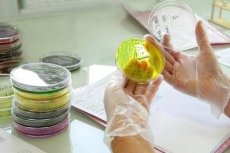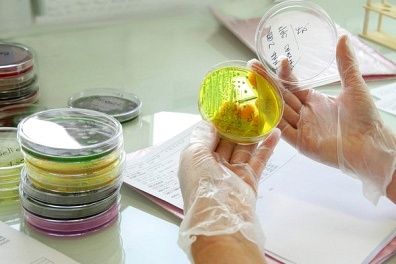
All iLive content is medically reviewed or fact checked to ensure as much factual accuracy as possible.
We have strict sourcing guidelines and only link to reputable media sites, academic research institutions and, whenever possible, medically peer reviewed studies. Note that the numbers in parentheses ([1], [2], etc.) are clickable links to these studies.
If you feel that any of our content is inaccurate, out-of-date, or otherwise questionable, please select it and press Ctrl + Enter.
Bacteriologist
Last reviewed: 03.07.2025

Bacteria are everywhere and all around, so it is easy to "catch" a disease caused by bacteria. In addition, these microscopic creatures can affect the body in the most unpredictable way. For these reasons, we ask ourselves who treats diseases caused by diseases, a bacteriologist and his competence, and of course, what to do to minimize the likelihood of getting sick.
A bacteriologist is relevant not only in the presence of a certain disease, but also for preventive purposes, especially for those who have small children at home. He can advise on precautions, conduct diagnostics and prescribe treatment.
Who is a bacteriologist?
From the name it is clear that a bacteriologist is a doctor who specializes in bacteriology. But why such a narrow name? Why does it not include viruses or other microorganisms? Why only bacteria?

Firstly, bacteria and other microorganisms have different natures, structures and, accordingly, have different properties that lead to certain consequences - to diseases.
Secondly, there is a whole list of diseases caused by bacteria, of which there are also many. And if we add fungal microbes and viruses to bacteriology, then it will have a more general name - microbiology.
It was for these reasons that it was decided to create a narrower specialization - a bacteriologist who deals directly with the study of bacteria.
When should you contact a bacteriologist?
A bacteriologist is the same as an infectious disease specialist, only in a narrower sense. Therefore, you should contact him if you suspect the presence of diseases that arose on the basis of such microorganisms:
- aerobes - streptococci, staphylococci, enterococci, enterobacteria, non-fermenting),
- naerobes - Veilonella, Porphyromonas, Prevotella, Peptostreptococcus, Propionibacterium, Bacteroides, Fusobacterium, Actinomyces, Gemella, Eubacterium, Clostridium.
- Before analyzing anything, a bacteriologist will order an examination based on tests, including bacteriological culture.
What tests should be taken when visiting a bacteriologist?
It is clear that a bacteriologist prescribes bacteriological tests. They are taken in bacteriological laboratories, which can be independent structures or located at some institution, for example, venereology, sanitary and epidemiological station.
Let's move on to the tests. A bacteriological blood test is taken in case of granulocytopenia, leukocytosis, low body temperature, fever. In these cases, blood is examined to determine bacteremia, which is caused by almost any microbes. Of course, if a person uses antimicrobial drugs, the test results may be slightly distorted. The most reliable result is if the patient's blood is taken at the time when he suffers from chills and high temperature, since during this period the human body is attacked more intensively than in its normal state.
The amount of blood required to identify the cause of the disease:
- newborns: 1 - 2 ml,
- children: 2 - 5 ml,
- Adults: 10 ml.
Urine tests for bacteria do not require preliminary preparation of the patient. Before taking the tests, you should wash the genitals and collect morning urine in a sterile container. This analysis is usually carried out to detect bacteria in the bladder and kidneys.
Stool analysis reveals intestinal infections, as well as dysbacteriosis and salmonellosis.
Also, if an infection has entered a wound received during an injury, then pus released from the wound can be diagnosed.
In addition, biochemical tests are performed by gynecologists for the presence of STDs, such as chlamydia, for this a smear is taken from the genitals. The same tests are also performed by a venereologist. But the test itself is performed by a bacteriologist using special equipment.
What diagnostic methods does a bacteriologist use?
At the current stage of development of medicine, several types of diagnostics are distinguished for identifying infections in the body, we will consider those that a bacteriologist uses:
- identification of pure cultures. The presence of bacteria is determined by biochemical, cultural, morphological, tinctorial and toxigenic features regarding virulence and antigen structure. This process is carried out by bacteriological, biological and immune examinations. This method is called mechanical separation of microbes. Due to the fact that it is too labor-intensive, it is rarely used in laboratory research,
- colony - a concentration of bacteria of one species that formed in the process of division of one bacterial cell under cultured conditions,
- the cultural characteristics of bacteria are determined using the morphology of colonies and the characteristics of the development of the culture on the nutrient medium,
- The biochemical characteristics of bacteria are determined using a set of enzymes of one variety.
A bacteriologist selects the method of analysis that he considers optimal for identifying a particular disease; for example, tuberculosis can be examined using a culture method, fluorescent microscopy, the BACTEC system, and so on.
What does a bacteriologist do?
If a specialist whose qualification is aimed at studying bacteria, then, of course, he will be engaged in the causes of infectious diseases involving bacteria, their morphological, genetic, antigenic and similar properties. Also, a bacteriologist determines the methods and techniques of diagnosis, treatment and prevention of bacteriological diseases.
In addition to diseases, a bacteriologist monitors food products! So, if someone has suspicions about the sterility of some food products, you can safely contact him. He will analyze the object under a microscope for bacteria. Let's not go into the methods of researching products, let's consider his competence as a doctor.
What diseases does a bacteriologist treat?
The answer to this question can be short: a bacteriologist treats all diseases that arise from bacteria.
Let's consider what diseases there may be:
- dysbacteriosis. Most often, children suffer from it, who put everything in their mouths. Also, antibiotics can be the cause of this consequence,
- salmonellosis. As a rule, the transmitters of the bacteria of this disease are animals and animal products, such as eggs,
- a gram-negative rod-shaped bacterium or E. coli, which causes a whole range of ailments, such as diarrhea, cystitis, prostatitis, and so on,
- Staphylococci are nasty things that seem to be everywhere. And, what's more, they are very common in children. This type of bacteria can cause dysbacteriosis and a number of other diseases.
In fact, there are many more diseases that a bacteriologist treats, especially since there are almost 10,000 known types of bacteria, and each of them causes several diseases.
Advice from a bacteriologist
A bacteriologist, like any other infectious disease doctor, a microbiologist always gives the most basic advice: follow the rules of hygiene! In transport, on the way to the store or home, we come into contact with the environment, which is full of "little creatures", including microorganisms. When microbes enter the body, a serious disease can occur, for example, dysentery. In addition, we do not know with whom we were talking, that is, with a healthy or a sick person. Regarding intestinal infections, I would like to say that they occur, most often, due to the fact that underwashed or unwashed products get into our esophagus. Furthermore, you cannot buy untested food products "from grannies", for example, homemade milk or eggs, which can be a consequence of salmonellosis.
Another important warning: use protection during sexual intercourse, well, we are all adults now, trust is trust, but gonorrhea is a serious and painful thing.
The bacteriologist advises everyone who is going on a hike or active recreation not to forget about antiseptics, as open wounds (which are easy to get on a hike, especially for children) are the best place for various microbes, not just bacteria, to be located. Therefore, they need to be treated, for example, with brilliant green.
 [ 5 ]
[ 5 ]
